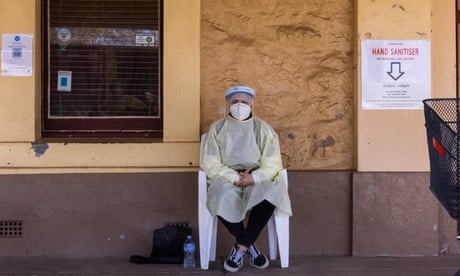- by foxnews
- 08 Apr 2025
Covid could overwhelm ?chronically understaffed? health facilities in western NSW
Covid could overwhelm ‘chronically understaffed’ health facilities in western NSW
- by theguardian
- 22 Dec 2021
- in news

Health facilities in western New South Wales are "chronically understaffed" and the situation could be exacerbated as Covid-19 cases climb in regional local health districts before the holiday period.
The NSW Nurses and Midwives' Association raised the alarm about growing nurse vacancies in the state's west with communities such as Lightning Ridge left with more than 140 vacant nursing shifts in their multi-purpose services over the coming month.
The widespread inability to fill rising nurse vacancies and critical gaps in rosters led to senior nurse managers in 12 health facilities across western NSW taking the unprecedented action of stopping work for two hours on Tuesday.
This problem comes as Peta Rutherford, the chief executive of the Rural Doctors Association of Australia, said there were continued outbreaks and increasing numbers of Covid-19 cases in regional Australia, with the expectation that cases will rise as more people travel during the holiday period.
Brett Holmes, the NSW Nurses and Midwives' Association general secretary, said nurses, particularly nurse managers, were doing excessive additional hours, working unbroken periods of more than 18 days straight, often more than 16 hours a day.
The situation was at "the point of totally exhausting the nursing workforce".
"These services can't continue to operate without minimum nursing staff levels and we can't fill even those," Holmes said. "These facilities are chronically understaffed.
"Every day is a potential patient disaster waiting to happen. Nurses live their lives knowing that anything can come through their door unexpectedly and they may not be able to deliver the care they know these patients need."
The rising number of Covid-19 cases in NSW had the potential to make the situation even more dire, he said. In many locations it only took one nurse having to isolate to make the health service unviable.
Holmes said any acutely ill Covid patients would require transfer to a larger hospital in a regional centre or Sydney but, because nurses had to wait with the patient for the transport to arrive in case of the need for resuscitation, they would not be able to look after the aged care residents they were also responsible for in multipurpose services.
Mark Spittal, the acting chief executive of the Western NSW local health district, said that on average 25 people a day were being infected with Covid in the region, with case numbers rising.
Spittal said 40 staff were unable to work because they had been infected or were a close contact of someone who was.
"We are expecting to see a significant increase in the numbers of cases across NSW and across our district, but I have to stress Covid-19 in the context of a community that is 96% double vaccinated is a very, very, very different scenario to what it was back in July before vaccination got taken up by the community."
Asked if the rising case numbers would exacerbate the problem of unfilled nursing shifts, Spittal said it was "always a possibility moving forward" but that a pandemic response, similar to natural disaster response, would see the NSW health system come together to deploy staff across the state.
But Rutherford said the Rural Doctors Association, at both state and federal level, had flagged that there was limited surge workforce capacity because most of it had been taken up by demand in capital cities or large regional centres, where there have been much larger outbreaks.
"We've got an overstretched workforce that was already short on the ground pre-pandemic that is now being absorbed through the testing and vaccination clinics, and now that we're getting cases in these communities, the workforce shortages are being felt and being felt hard in these hospitals," Rutherford said.
When Covid-19 broke out in Mildura, she said, despite the talk about surge capacity "we know on the ground" it was the local workforce that absorbed the demand, working extra shifts and overtime.
Of the 3,057 cases reported to 8pm Monday night in NSW, most emerged in the Hunter New England local health district, with 820 infections.
Peter Wark, a conjoint professor at University of Newcastle and a senior member of the Priority Research Centre for Healthy Lungs, said there had not been a significant increase in hospital admissions but quite a lot of people were receiving in-home care.
Wark said it was probably too early to see the full impact, but he expected the next few days to be "telling", as hospital admissions typically increase seven to 10 days after infection, with the super-spreader event at the Argyle House nightclub having been held last Wednesday.
He said the potential increase in presentations would come at "a tricky time of the year as it is a time when the system steps down rather than steps up".
It was a struggle for a regional and remote area where there was never any surge capacity in the first place, and it would not be made any better by the Christmas period.
Wark said the outbreak was "very much urban-centred" in Newcastle but "that will inevitably change".
Of communities experiencing their first outbreak, Rutherford said: "It is concerning we do know that many of our rural and regional locations still have not got well-drafted or well-coordinated plans in place.
"Often it's not until communities get their first case that we see true development of a cohesive plan in relation to treatment of Covid patients. And that's unacceptable."
- by foxnews
- descember 09, 2016
Ancient settlement reveals remains of 1,800-year-old dog, baffling experts: 'Preserved quite well'
Archaeologists have recently unearthed the remarkably well-preserved remains of a dog from ancient Rome, shedding light on the widespread practice of ritual sacrifice in antiquity.
read more


